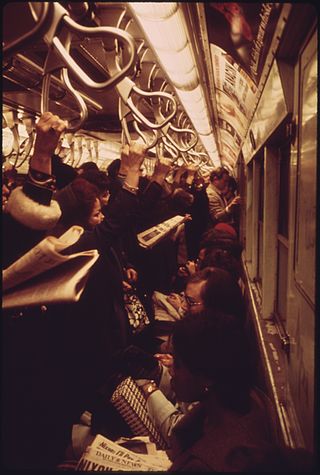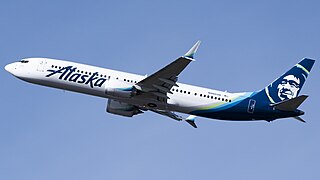Related Research Articles

KLM Royal Dutch Airlines, legally Koninklijke Luchtvaart Maatschappij N.V., is the flag carrier of the Netherlands. KLM is headquartered in Amstelveen, with its hub at nearby Amsterdam Airport Schiphol. It is a subsidiary of the Air France–KLM group and a member of the SkyTeam airline alliance. Founded in 1919, KLM is the oldest operating airline in the world, and has 35,488 employees with a fleet of 110 as of 2021. KLM operates scheduled passenger and cargo services to 145 destinations.

London Stansted Airport is the tertiary international airport serving London, England. It is located near Stansted Mountfitchet, Essex, 42 mi (68 km) northeast of Central London.

The Boeing 737 is a narrow-body aircraft produced by Boeing at its Everett and Renton factories in Washington. Developed to supplement the Boeing 727 on short and thin routes, the twinjet retained the 707 fuselage width and six abreast seating but with two underwing turbofans instead of four. Envisioned in 1964, the initial 737-100 made its first flight in April 1967 and entered service in February 1968 with Lufthansa. The lengthened 737-200 entered service in April 1968, and evolved through four generations, offering several variants for 85 to 215 passengers.

A wide-body aircraft, also known as a twin-aisle aircraft and in the largest cases as a jumbo jet, is an airliner with a fuselage wide enough to accommodate two passenger aisles with seven or more seats abreast. The typical fuselage diameter is 5 to 6 m. In the typical wide-body economy cabin, passengers are seated seven to ten abreast, allowing a total capacity of 200 to 850 passengers. Seven-abreast aircraft typically seat 160 to 260 passengers, eight-abreast 250 to 380, nine- and ten-abreast 350 to 480. The largest wide-body aircraft are over 6 m (20 ft) wide, and can accommodate up to eleven passengers abreast in high-density configurations.

Ryanair Holdings PLC is an Irish ultra low-cost carrier group headquartered in Swords, Dublin, Ireland. The company includes the subsidiaries Ryanair DACTooltip Designated activity company, Malta Air, Buzz, Lauda Europe and Ryanair UK. Ryanair DAC, the oldest airline of the group, was founded in 1984. Ryanair Holdings was established in 1996 as a holding company for Ryanair with the two companies having the same board of directors and executive officers. In 2019 the transition began from the airline Ryanair and its subsidiaries into separate sister airlines under the holding company. Later in 2019 Malta Air joined Ryanair Holdings.
EVA Airways Corporation, of which "EVA" stands for Evergreen Airways, is one of the two largest airlines in Taiwan – the other being China Airlines. It operates passenger and dedicated cargo services to over 40 international destinations in Asia, Australia, Europe, and North America. In contrast to the state-owned flag carrier China Airlines, EVA Air is privately owned and flies a fully international route network with no domestic destinations. It is rated as a 5-star airline by Skytrax, and is the second largest airline based in Taiwan after China Airlines. EVA Air is headquartered at Taoyuan International Airport in Luzhu, Taoyuan City. The company slogan is "Sharing the World, Flying Together".

A low-cost carrier or low-cost airline (LCC), also called no-frills, budget or discount carrier or airline, is an airline that is operated with an emphasis on minimizing operating costs. Without some of the traditional services and amenities of traditional airlines, it allows lower fares though provides fewer comforts. To make up for revenue lost in decreased ticket prices, the airline may charge extra fees such as for carry-on baggage. As of April 2020, the world's largest low-cost carrier is Southwest Airlines, which operates primarily in the United States, as well as in some surrounding areas.

Business class is a travel class available on many commercial airlines and rail lines, known by brand names which vary, by airline or rail company. In the airline industry, it was originally intended as an intermediate level of service between economy class and first class, but many airlines now offer business class as the highest level of service, having eliminated first class seating. Business class is distinguished from other travel classes by the quality of seating, food, drinks, ground service and other amenities. In commercial aviation, full business class is usually denoted 'J' or 'C' with schedule flexibility, but can be many other letters depending on circumstances.
Economy class, also called third class, coach class, steerage, or to distinguish it from the slightly more expensive premium economy class, standard economy class or budget economy class, is the lowest travel class of seating in air travel, rail travel, and sometimes ferry or maritime travel. Historically, this travel class has been called tourist class or third class on ocean liners.

Málaga Airport, officially Málaga–Costa del Sol Airport since June 2011, is the fourth busiest airport in Spain after Madrid–Barajas, Barcelona and Palma de Mallorca. It is significant for Spanish tourism as the main international airport serving the Costa del Sol. It is 8 km (5.0 mi) southwest of Málaga and 5 km (3.1 mi) north of Torremolinos. The airport has flight connections to over 60 countries worldwide, and over 14.4 million passengers passed through it in 2015. In 2017, 18.6 million passengers passed through Málaga Airport.

In-flight entertainment (IFE) refers to the entertainment available to aircraft passengers during a flight. In 1936, the airship Hindenburg offered passengers a piano, lounge, dining room, smoking room, and bar during the 2+1⁄2-day flight between Europe and America. After World War II, IFE was delivered in the form of food and drink services, along with an occasional projector movie during lengthy flights. In 1985 the first personal audio player was offered to passengers, along with noise cancelling headphones in 1989. During the 1990s, the demand for better IFE was a major factor in the design of aircraft cabins. Before then, the most a passenger could expect was a movie projected on a screen at the front of a cabin, which could be heard via a headphone socket at their seat. Now, in most aircraft, private IFE TV screens are offered.

An airline seat is a seat on an airliner in which passengers are accommodated for the duration of the journey. Such seats are usually arranged in rows running across the airplane's fuselage. A diagram of such seats in an aircraft is called an aircraft seat map.

An aircraft cabin is the section of an aircraft in which passengers travel. Most modern commercial aircraft are pressurized, as cruising altitudes are high enough such that the surrounding atmosphere is too thin for passengers and crew to breathe.

Airport check-in is the process whereby an airline approves airplane passengers to board an airplane for a flight. Airlines typically use service counters found at airports for this process, and the check-in is normally handled by an airline itself or a handling agent working on behalf of an airline. Passengers usually hand over any baggage that they do not wish or are not allowed to carry in the aircraft's cabin and receive a boarding pass before they can proceed to board their aircraft.

The Boeing 737 Next Generation, commonly abbreviated as 737NG, or 737 Next Gen, is a twin-engine narrow-body aircraft produced by Boeing Commercial Airplanes. Launched in 1993 as the third generation derivative of the Boeing 737, it has been produced since 1997 and is an upgrade of the 737 Classic (−300/-400/-500) series.

In urban public transport, provision is made for standing passengers, often called straphangers or standees, to rationalize operation and to provide extra capacity during rush hour.
The vertical seat is an airline seat configuration, created in 2003 by Airbus, canvassed to Asian carriers in 2006, and promoted by Ryanair as well as Spring Airlines in 2010. The configuration involves standing passengers travelling while being braced in position.
Aviointeriors S.p.A. is an Italian manufacturer of airline seats. Some of Aviointeriors' competitors include BE Aerospace, Recaro, and Zodiac Aerospace.

The Boeing 737 MAX is the fourth generation of the Boeing 737, a narrow-body airliner manufactured by Boeing Commercial Airplanes, a division of American company Boeing. It succeeds the Boeing 737 Next Generation (NG) and competes with the Airbus A320neo family. The new series was announced on August 30, 2011. It took its maiden flight on January 29, 2016 and was certified by the United States Federal Aviation Administration (FAA) in March 2017. The first delivery was a MAX 8 in May 2017 to Malindo Air, with which it commenced service on May 22, 2017.

The fuel economy in aircraft is the measure of the transport energy efficiency of aircraft. Fuel efficiency is increased with better aerodynamics and by reducing weight, and with improved engine brake-specific fuel consumption and propulsive efficiency or thrust-specific fuel consumption. Endurance and range can be maximized with the optimum airspeed, and economy is better at optimum altitudes, usually higher. An airline efficiency depends on its fleet fuel burn, seating density, air cargo and passenger load factor, while operational procedures like maintenance and routing can save fuel.
References
- 1 2 3 CNN, "Giddyup: Saddle seat a new squeeze on fliers?", Marnie Hunte, 14 September 2010 (accessed 15 September 2010)
- 1 2 3 The Daily Telegraph, "SkyRider: new 'saddle' seat allows airlines to 'cram' more passengers", Andrew Hough, 14 September 2010 (accessed 15 September 2010)
- 1 2 New York Daily News, "Saddle up! New airplane seat design is made for cowpokes, not real passengers", Robert Dominguez, 14 September 2010 (accessed 15 September 2010)
- 1 2 Aviation International News, "High-density Seats Squish Penurious Passengers" Archived 2010-09-18 at the Wayback Machine , Matt Thurber, 15 September 2010 (accessed 15 September 2010)
- ↑ CTV News, "World's most-cramped airplane seat to launch", 15 September 2010 (accessed 15 September 2010)
- ↑ Times of India, "A saddle-like seat to squeeze in more flyers", 15 September 2010 (accessed 15 September 2010)
- ↑ National Post, "Italian company unveils ‘saddle seat’ for airlines", Ron Nurwisah, 15 September 2010 (accessed 15 September 2010)
- ↑ The Daily Telegraph, "Ryanair to sell £5 tickets for standing-room only flights", Laura Roberts, 1 July 2010 (accessed 15 September 2010)